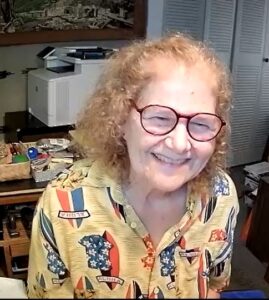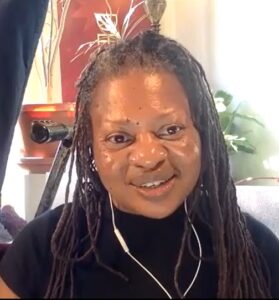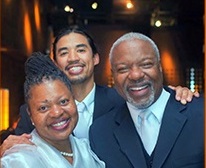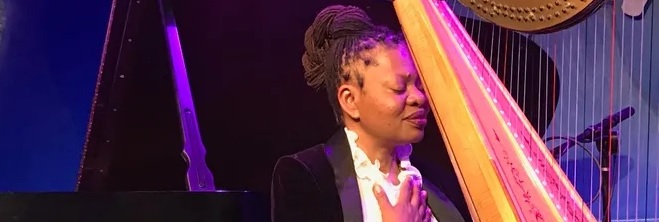“There’re still conversations in … music that are still alive. And so in this new millennium, what do I have to say as a participant in all those conversations?”
– Destiny Muhammad
AMN Founder Lolly Lewis sat down with Destiny over Zoom to discuss the possibilities of AMN’s new workshop format, about Destiny’s devotion to the jazz tradition, and much more.
 Lolly Lewis: I’m so excited about our workshop. You know, it’s been a year since you did that wonderful online workshop for AMN talking about the roots of jazz harp. And how great that you’re coming back with your trio to kick off our new series. This is going to be an opportunity for people to play with a professional ensemble in the comfort of home: you will be playing live at the wonderful theater at Drew School, and our participants will be at home with their instruments playing along with you. It’s going to be a new and innovative workshop model that we’re very excited about.
Lolly Lewis: I’m so excited about our workshop. You know, it’s been a year since you did that wonderful online workshop for AMN talking about the roots of jazz harp. And how great that you’re coming back with your trio to kick off our new series. This is going to be an opportunity for people to play with a professional ensemble in the comfort of home: you will be playing live at the wonderful theater at Drew School, and our participants will be at home with their instruments playing along with you. It’s going to be a new and innovative workshop model that we’re very excited about.
Destiny Muhammad: As am I! It’s definitely very innovative. And, you know, it’s going to be exciting for all of the participants who will have that opportunity to play and to actually interact with us, with Q&A happening during that time as well.
LL: People are very inspired by your devotion to the jazz tradition and the fundamentals of this music. That you really have a passion to convey and to bring people along with the joy that you find in music. I think that’s just so infectious and people really respond to it.
 DM: I keep going back to the fundamentals. I can’t speak for everyone else but for me, the fundamentals have always been my launchpad. And when I have those and I feel them, not just in my hands but circulating throughout my DNA, then I feel like I can go anywhere with the music. And so I love the fundamentals. I just keep coming back to those ABCs of jazz.
DM: I keep going back to the fundamentals. I can’t speak for everyone else but for me, the fundamentals have always been my launchpad. And when I have those and I feel them, not just in my hands but circulating throughout my DNA, then I feel like I can go anywhere with the music. And so I love the fundamentals. I just keep coming back to those ABCs of jazz.
LL: I think a lot of people who aspire to learn to improvise might feel like oh, I just have to jump off this cliff and do something that’s out of my comfort zone. But what you’ve just said has really sort of turned the light on for me, because if we get into [the fundamentals] we’re not jumping off anything; we’re going from a place of simplicity. And then it can grow and develop and that’s where the skill comes from.
DM: That’s why, even after 30 years of being a musician, I keep going back to the listening. I still need to listen, and then apply it to my instrument. I really encourage folks to really listen.
And I remember being a shorty in the music and hearing the word conversation said to me over and over again, and I didn’t really get it. And then it started to click… I liken it to European classical music where you’ve got chamber music, and you’ve got a cellist and maybe a violist and a violinist and everybody has to be strong in their understanding of the music. And then they come together and they’ve all been studying a particular song or suite of music. But everybody’s strong enough where they’re playing and listening, and their portion of the conversation is shared. And so [in the trio], we’ve all been independently what they call shedding. And then we come together with our own understanding of the music so we can bring that conversation. What is it that I have to say, in [Miles Davis’s] All Blues on my instrument? I’m feeling like I have something to contribute. What do I have to say as a participant in those conversations?
And so that’s what I see when I’m listening to each player. Each one is bringing all of their life experience. This is the thing that I want to share with the participants: bring all your life experience, whatever that is. Here’s the music. Miles wrote it, but what do you have to say?
LL: And that conversation is going to be so fun for people, not only to learn from you, but to really feel like they’re part of the ensemble and that they’re welcomed into that music experience.
DM: It would be wonderful to see you there in the virtual house!!P
Listen to the whole interview and join us on September 18th!
